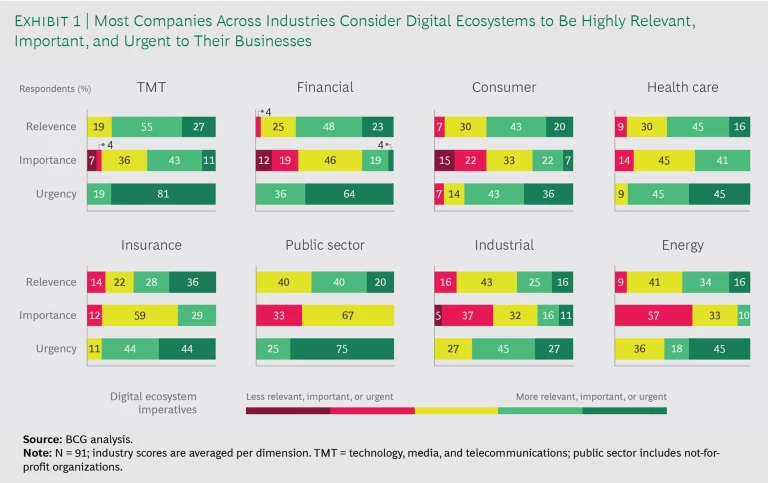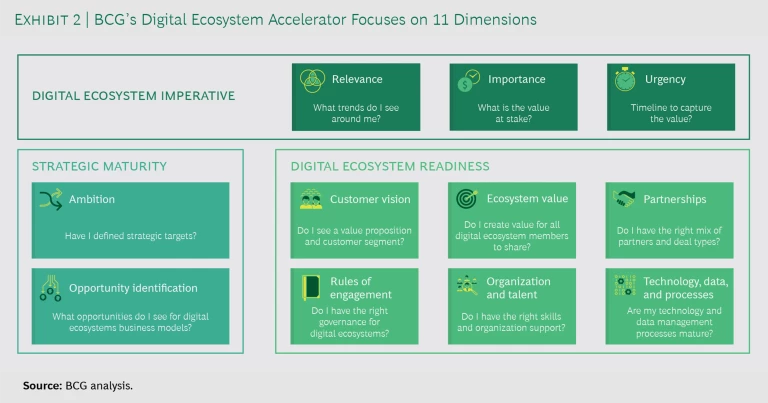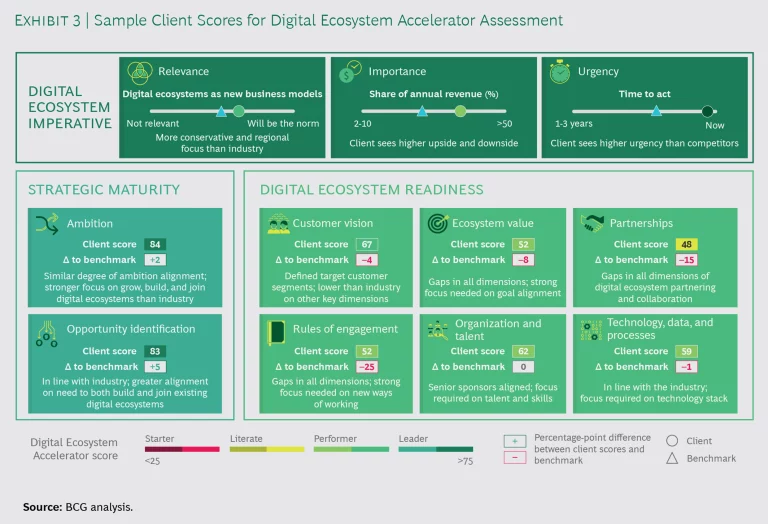Of all the ways digitalization is altering business models and relationships between companies and their customers, no single new development has been as significant—or potentially lucrative—as the emergence of digital ecosystems. In fact, a majority of companies responding to a recent BCG survey said that participating in a digital ecosystem will be imperative in the next three years. Yet despite the importance of digital ecosystems, many companies still lag in their efforts to participate. Primarily, this is because they are uncertain about whether they are suited to build or join a digital ecosystem, what roles they can play on digital platforms, and how to identify and develop the capabilities they need to participate.
The Digital Ecosystem Accelerator by BCG, or DE Accelerator, is an essential tool for addressing these uncertainties. Created for C-suite executives; business unit heads; and digital, innovation, and new-business development leaders, the DE Accelerator assesses the strategic maturity and readiness of organizations to build or join a digital ecosystem. It also benchmarks the company’s digital ecosystem capabilities and potential against competitors.
In our BCG survey, which is drawn from ongoing interviews with DE Accelerator clients, fully one-quarter of the companies said that digital ecosystems will account for greater than 60% of sales in their industries within three years, and about 30% of companies expected digital ecosystems to impact annual profit by at least 25% in that time. Clearly, whether your company is large or small, building or joining one or more digital ecosystems is quickly shifting from optional to imperative in virtually every industry. (See Exhibit 1.)
What Are Digital Ecosystems?
Digital ecosystems are groups of interdependent companies that jointly deliver digitally enabled, integrated products and services to meet the needs of their customers. From a consumer’s perspective, the best way to envision a digital ecosystem is as a seamless collection of devices, apps, and services from multiple businesses. Think, for example, of a smart-home network; a connected car; or an e-health platform offering insurance as well as online doctor appointments and fulfillment of prescriptions.
Companies that are building or participating in digital ecosystems grow faster and are more innovative and resilient in crises than others.
Companies that are building or participating in digital ecosystems grow faster and are more innovative and resilient in crises than others. One recent success story: a leading airline leveraged its loyalty program to design a digital ecosystem providing health, car, home, travel, and life insurance as well as special offers on running shoes, smart watches, nutritional foods, clothing, and GPS equipment. This ecosystem generated $1 billion in new business for the airline within five years. What’s more, seven of the ten most valuable (by market cap) global companies have digital ecosystems at the core of their business models. And 40% of the global top 30, highest-valued B2C and B2B brands are involved in digital ecosystems.
Participants in digital ecosystems can take one of three roles:
- Orchestrators that own and manage the end-to-end customer journey
- Partners that provide differentiated products, services, and brands sold on the platform in order to secure their own customer contact point
- Contributors that enable the digital ecosystem’s business model—such as by adding connectivity, user authentication, and ancillary programs—but have no direct interface with the customer
Three Key Questions
Applying BCG’s DE Accelerator is the first critical step in a company-wide discussion of developing or joining a digital ecosystem, and it results in a plan for achieving success with the new business model. To arrive at this plan, the DE Accelerator assesses a company’s digital ecosystem maturity by prompting consideration of three comprehensive questions:
- Why should I engage in digital ecosystems?
- What do I want to achieve with digital ecosystems?
- Am I ready to be a leader in digital ecosystems?
Each of these questions opens the door to other, more granular considerations that provide a clearer picture about a company’s digital ecosystems prospects and the right strategies to adopt. (See Exhibit 2.)
Why should I engage in digital ecosystems? This question goes to the heart of why it is imperative for your company to participate in digital ecosystems. To explore this, we analyze the degree to which competitors in your sector already offer digitally enabled, integrated products or services and are involved in cross-industry or multiregional digital ecosystem collaborations. We also look at the value potential—both the upside of participation and the risk of nonparticipation—of digital ecosystems in your market as well as how quickly you can conceivably capture value.
What do I want to achieve with digital ecosystems? In other words, have you identified clear opportunities? Have you set your digital ecosystem goals? And how well aligned are these goals to the company’s core strategy? Some answers will have emerged from the initial DE Accelerator analysis. But this stage is meant to be much more specific and actionable. The company’s ambitions for engaging in digital ecosystems—perhaps a percentage of revenue and profits from new sales channels or the prospective product mix or the new markets that you can enter—should be clearly defined and well within the realm of possibility.
The high-level strategies to achieve these goals should be similarly distinct, a mature reflection of the very real opportunities that you can take advantage of immediately. Should you join an existing digital ecosystem or build your own—be a partner or an orchestrator? The answers will come from an assessment of your company’s digital ecosystem ambitions, its digital expertise and strengths, and how prepared the company and the company’s culture is to build or participate in digital ecosystems.
Am I ready to be a leader in digital ecosystems? This question drills down into the precise capabilities and relationships that a company needs to put a digital ecosystem strategy into action. Distinct from high-level goals and strategies, this dimension of the DE Accelerator assessment examines the individual moving parts of a digital ecosystem business model and determines which of those parts are sufficiently mature for the company to move toward its targeted aims. For instance, the DE Accelerator explores whether there is a defined customer segment with real and obvious value for the digital ecosystem that your company wants to develop or participate in. It also considers the added value you bring to the platform and how that value can be expected to expand the digital ecosystem’s revenue, partnership shares, and incentives, as well as the depth of products and services offered. The flip side is also examined: does the digital ecosystem have the right mix of collaborators to be of value to your company?
In addition, the DE Accelerator’s readiness analysis evaluates how well the company’s wide variety of capabilities match those required to succeed in digital ecosystems environments. Governance—including a track record and procedures for quick and targeted decision making and intellectual-property protection in a collaborative business model—is one of the capabilities examined in this stage, for example. Organizational structure and talent, which, among other things, measures the strength of the company’s innovation culture and the creativity and imagination of its venture management, is another. Technology capabilities are equally important. A company with only a limited technology stack and little familiarity with platform design and development, data sharing, and interactions with external technology systems will have to make a significant commitment to upgrading its technology infrastructure, talent, and investments if it hopes to be successful in digital ecosystems.
How Do You Stack Up?
On the basis of the answers to the three questions above and the deep-dive analysis they lead to, BCG’s Digital Ecosystem Accelerator produces a score sheet that portrays a company’s digital ecosystem strategic maturity level and readiness across 30 dimensions.
The data BCG gathers to produce the score sheet also serves as the fulcrum for the centerpiece of the DE Accelerator: a benchmark that allows individual companies to compare their digital ecosystem maturity and readiness against their industry and regional peers. BCG helps companies use this data to make decisions about the dimensions and timing of their digital ecosystems’ programs and strategies.
BCG’s DE Accelerator produces a score sheet that portrays a company’s digital ecosystem strategic maturity level and readiness across 30 dimensions.
To support the DE Accelerator benchmark, BCG has already gathered data from more than 90 companies with more than $1 billion in revenue in 16 countries across all industries. Viewed through the lens of overall maturity, companies in the health care and energy sectors are benefiting the most—or at least are most prepared to benefit—from digital ecosystems. Lagging behind are companies in the public sector and consumer goods industries. And perhaps a bit surprising—considering the rapidly growing popularity among consumers of such digital ecosystems as e-commerce sites, apps, connectivity, and smart machines—B2B companies are more prepared to participate in digital ecosystems than B2C firms.
How to Deploy the Digital Ecosystem Accelerator
The DE Accelerator can be deployed in a few weeks and is tailored to your company’s needs. By the end of the project, a company receives four key outputs:
- A comparison of its digital ecosystem ambitions with those of similar companies and business units
- Granular benchmarking of its digital ecosystem capabilities, strategic maturity, and readiness stacked up against other companies in their industry and region (for a sample of these results, see Exhibit 3)
- A clear analysis of which capabilities and skills the company would need and which strategies it would have to deploy to build or join digital ecosystems
- A plan of action, including the implications of different strategic approaches to participate in digital ecosystems and where the company must focus its efforts to close any digital ecosystem maturity gap that places it behind other industry players
In today’s rapidly digitizing business environment, two things seem certain among many ambiguities. First, digital ecosystem business models are going to play an outsized role in consumer and B2B sectors over the short-to-medium term. And second, most companies are not prepared for this transition. Figuring out how to engage in digital ecosystems on your own is not a particularly effective approach, chiefly because time is of the essence and the analysis to determine future strategies must take into account a set of unique capabilities required to engage in this novel form of collaborative business model—a degree of knowledge that few companies have.
The Digital Ecosystem Accelerator by BCG can manage both of these concerns. The DE Accelerator is a rapid checkup and assessment, supported by a growing database of information about digital ecosystems activity in virtually every major industry, region, and marketplace. And it is embedded with invaluable expertise about the pitfalls of ill-chosen digital ecosystems strategies and the right approaches to give digital ecosystems the best chances to succeed.














